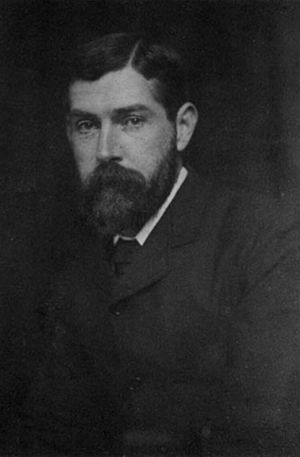British idealism facts for kids

British idealism was a way of thinking about philosophy that was popular in Britain from the mid-1800s to the early 1900s. It was part of a bigger idea called absolute idealism.
Some of the main thinkers in this movement were T. H. Green, F. H. Bradley, and Bernard Bosanquet. Later, other important philosophers like J. M. E. McTaggart and R. G. Collingwood continued these ideas.
However, two young philosophers, G. E. Moore and Bertrand Russell, strongly disagreed with British idealism. Their ideas led to a new way of thinking called analytic philosophy.
Contents
What is British Idealism?
British idealism had a few main ideas:
- They believed in something called the Absolute. This was a single, all-encompassing reality that connected everything in the world.
- They thought that reason was very important. Reason was both how we understand the Absolute and what the Absolute itself was made of.
- They did not believe that thoughts and objects were separate. Instead, they saw reality as a strong mix of both thought and objects working together.
Where Did It Come From?
British idealism got many of its ideas from German idealism. Famous German thinkers like Immanuel Kant and G. W. F. Hegel were very important to them. Thinkers like T. H. Green believed these German ideas helped save British philosophy.
Thomas Carlyle also helped people in Britain learn about German idealism. His own writings were very important to the British idealists.
This movement was also a reaction against other British philosophers. They disagreed with thinkers like John Locke, David Hume, and John Stuart Mill. These earlier philosophers focused on empiricism (learning through experience) and utilitarianism (doing what brings the most good).
For a long time, it was hard to read Hegel's works in Britain because there weren't good translations. But in 1865, James Hutchison Stirling published his book The Secret of Hegel. This book helped many people in Britain understand and accept Hegel's ideas.
How Was It Influenced by Hegel?
British idealism took some general ideas and words from Hegel. For example, they used the idea of the Absolute. They also believed in:
- A doctrine of internal relations: This means that things are connected and defined by their relationships to other things.
- A coherence theory of truth: This idea says that something is true if it fits well with other things we believe to be true.
- A concrete universal: This is a complex idea, but it means that general concepts are not separate from specific examples.
Some of their writings even showed a kind of dialectical structure. This is a way of thinking that involves looking at opposing ideas to find a new, better understanding. However, most British idealists did not follow all of Hegel's philosophy. His complex ideas about logic were not widely used by them.
One later philosopher, G. R. G. Mure, was a deep student of Hegel. He believed in Hegel's main idea about reality throughout his life.
Political Ideas
On the political side, British idealists wanted to challenge a certain type of individualism. This was the idea that people are completely separate and independent, like Herbert Spencer believed.
The idealists thought that humans are naturally social beings. They believed people are connected to each other much more than Spencer and his followers recognized.
However, the British Idealists did not believe the government should have total power, like Hegel seemed to suggest. T. H. Green, for example, said that individuals were the most important. He argued that the government was only good if it helped individuals live better lives.
Why Did It Decline?
The influence of British idealism in the United Kingdom started to fade. This happened when Bertrand Russell and G. E. Moore, who had studied British idealism, began to argue against it. Moore, in particular, presented arguments that many people quickly accepted as proof against idealism.
In the late 1950s, G. R. G. Mure wrote a book called Retreat From Truth. In it, he criticized Russell and Ludwig Wittgenstein. He also looked at parts of analytic philosophy from an idealist point of view.
Influence in the United States
British idealism had less influence in the United States. Some early American thinkers, like Josiah Royce, had ideas similar to Hegel's. The American rationalist Brand Blanshard was also very influenced by Bradley, Bosanquet, and Green.
However, this limited influence mostly disappeared by the end of the 1900s. But since the 1990s, there has been new interest in these ideas. For example, the Michael Oakeshott Association was founded, and people are paying more attention to the works of Collingwood, Green, and Bosanquet again.
Important British Idealists
- F. H. Bradley
- J. M. E. McTaggart
- Bernard Bosanquet
- T. H. Green
- Edward Caird
- John Caird
- Henry Jones
- J. H. Muirhead
- H. H. Joachim
- A. E. Taylor
- R. G. Collingwood
- Michael Oakeshott
- William Temple
See also
- Timothy Sprigge
- List of British philosophers
- British philosophy
- Canadian idealism
 | Calvin Brent |
 | Walter T. Bailey |
 | Martha Cassell Thompson |
 | Alberta Jeannette Cassell |

